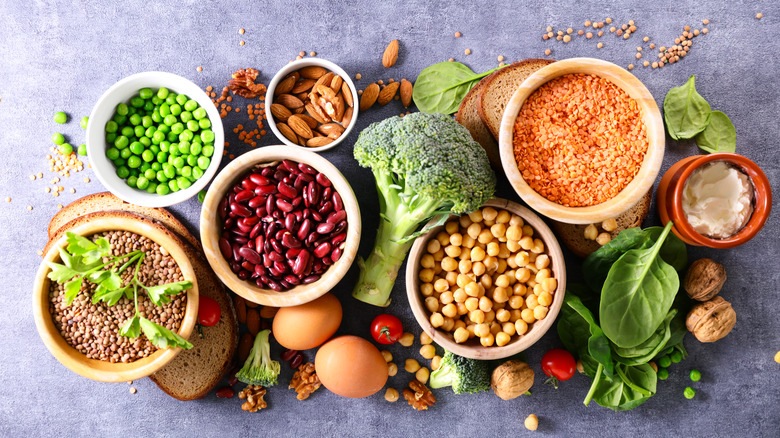The Different Types Of Vegetarian Diets
When many people think of vegetarianism, they think of simply abstaining from eating meat. However, there are multiple types of vegetarian diets that can be adapted to suit the needs and beliefs of each individual person.
Healthline points to the lacto-ovo vegetarian diet as the most common of the six types. Those who follow this diet eliminate meat and fish from their diet but continue to eat dairy and eggs. This type of vegetarian diet is often associated with the Hindu and Buddhist religions. The second type of vegetarian diet is called lacto-vegetarian. Similar to lacto-ovo diet followers, lacto-vegetarians consume dairy products, including cheese, milk, and ice cream. However, they choose not to eat eggs. The third type of vegetarian diet is ovo-vegetarian. People who follow this diet abstain from all dairy products but do eat eggs.
The next type is known as the pescatarian diet, which incorporates fish-based foods but excludes all meats (via Healthline). Pescatarians may or may not eat dairy and eggs, depending on their beliefs and preferences. This brings us to the flexitarian diet, which is the least strict of the vegetarian diets and prioritizes plant-based meals without completely excluding animal foods.
Finally, we have the vegan diet, which eliminates all animal-based foods, including meat, fish, dairy, eggs, and even honey. Vegans get their protein entirely from plant-based sources, such as legumes, nuts, soy, and plant-based meat and dairy substitutes. Now that you're familiar with the different vegetarian diets, you may be wondering if they're healthy.
Are vegetarian diets healthy?
As a general rule, all plant-based diets are considered healthy. The American Dietetic Association states that "appropriately planned vegetarian diets, including total vegetarian or vegan diets, are healthful, nutritionally adequate, and may provide health benefits in the prevention and treatment of certain diseases."
Harvard Health points out some of the health benefits associated with plant-based diets. For starters, vegetarians don't ingest as much saturated fat and cholesterol, which are found in high quantities in red meats, and they consume more vitamins and minerals overall. Vegetarians also tend to have lower blood pressure, lower bad cholesterol, and a lower body mass index (BMI), which reduce the risk of developing long-term and potentially life-threatening diseases.
A 2019 study published in the Journal of the American Heart Association found that plant-based diets have positive effects on cardiovascular health. Specifically, participants who consume greater amounts of plant-based foods over animal foods were found to have a lower risk of cardiovascular morbidity.
While vegetarian diets are very much healthy when appropriately planned, there are a few manageable risks associated with eliminating all animal products (via Harvard Health). Vegans, in particular, will need to ensure they are getting enough protein throughout the day by choosing from a variety of sources. They are also at risk of vitamin B12 deficiency, which is found in animal sources, and will need to take a vitamin supplement. A decrease in omega-3 fatty acids is another concern for those who abstain from fish and eggs, but algae supplements can compensate.


